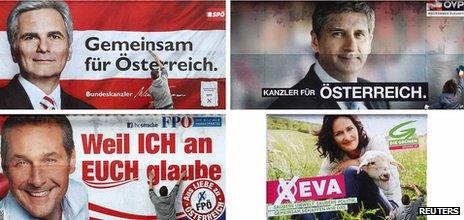Q&A: Austria parliamentary election
- Published

Chancellor Werner Faymann (top left) and his deputy, Michael Spindelegger (top right), hope to stay ahead of the competition
Austrians vote in parliamentary elections on Sunday to deliver their verdict on the six-year "grand coalition" between the two main parties.
Polls suggest the partnership of Chancellor Werner Faymann's Social Democrats and the conservative People's Party - formed in 2007 and re-elected in 2008 - may just about weather a tough challenge from a trio of right-wing populist, ecologist and free-market parties.
Who is in the running?
Currently the party with the most seats, the Social Democrat party - known by its German acronym SPOe - is focusing on jobs and pensions. It wants a tax on "millionaires", tax cuts for low earners and the extension of a bank levy.
Its leader, Chancellor Werner Faymann, 53, claims credit for keeping unemployment relatively low through the global economic crisis.
The People's Party (OeVP), is campaigning for measures to free businesses from red tape, and opposes new taxes - including the Social Democrats' wealth tax - as a strain on the economy.
The second largest party, it hopes to overtake the Social Democrats and install its leader, Michael Spindelegger, 53, currently Mr Faymann's deputy, in the top job.
Both parties have dominated Austrian politics since World War II. Unusual elsewhere, "grand coalitions" - initially aimed at avoiding Austria's pre-war turbulence - have been in government for 39 of the past 68 years.
However, a series of scandals and perceived inertia have eroded their combined share of the vote from 90% in the 1980s to just over 50%.
Billionaire Frank Stronach - plain "Frank" on his posters - is seeking to shake up Austrian politics
The main challenger is the Eurosceptic and anti-immigration Freedom Party (FPOe). The party, which has hopes of overtaking the People's Party, accuses the traditional duopoly of bloating the public sector, corruption and permitting too much immigration. Critics say the party panders to xenophobia.
Between 2000 and 2005, under charismatic far-right leader Joerg Haider, it formed a coalition with the People's Party that was widely condemned by EU leaders. Damaged by the late Haider's 2005 breakaway, its fortunes have since revived under current leader Heinz-Christian Strache, 44, a similarly polarising figure.
Also expected to do well are the Greens, led by Eva Glawischnig, 44. In addition to their traditional environment themes, they have sought to capitalise on a funding scandal involving the government parties.
A newcomer to Austrian politics is Team Stronach, the brainchild of Austrian-Canadian car-parts billionaire Frank Stronach, 81. Its strongly free-market programme includes demands for a flat tax and the abolition of the euro.
The Alliance for the Future of Austria (BZOe), the slightly more moderate 2005 breakaway from the Freedom Party led by Josef Bucher, 48, may struggle to get back into parliament.
What is likely to happen?
Barring surprises, another grand coalition looks likeliest. Mr Faymann has stated openly that is what he wants, and pollsters say the two leading parties have only an outside chance of losing their majority.
While keeping his options open, Mr Spindelegger has said his other possible coalition - with the Freedom Party and Team Stronach - is unrealistic, citing their Eurosceptic policies. A third option - a Social Democrat-Green coalition - looks unlikely to win a majority.
Opinion polls have the Social Democrats steady on 26-7% (29% at the last election in 2008), the People's Party on 22-23% (26% in 2008), the Freedom Party on 20-21% (18%) the Greens on 14-15% (10%), the Alliance for the Future of Austria on 2% (11%) and Team Stronach on 7%.
How does the electoral system work?
The 183 deputies in the National Council- the lower house of parliament - are elected by a complex system of proportional representation, using 39 regional constituencies, Austria's nine federal states and the entire country as electoral districts.
The system seeks to closely match the number of parties' seats in parliament to their share of votes cast, provided they reach a minimum hurdle of 4% of the vote.
It ensures parties rarely win an absolute majority, and coalitions are needed most of the time. The upper house of parliament, the Federal Council, which represents the federal states, is not involved in this election.
reports and analyses news from TV, radio, web and print media around the world. For more reports from ģÉČËŋėĘÖ Monitoring, click here. You can follow ģÉČËŋėĘÖ Monitoring on and .